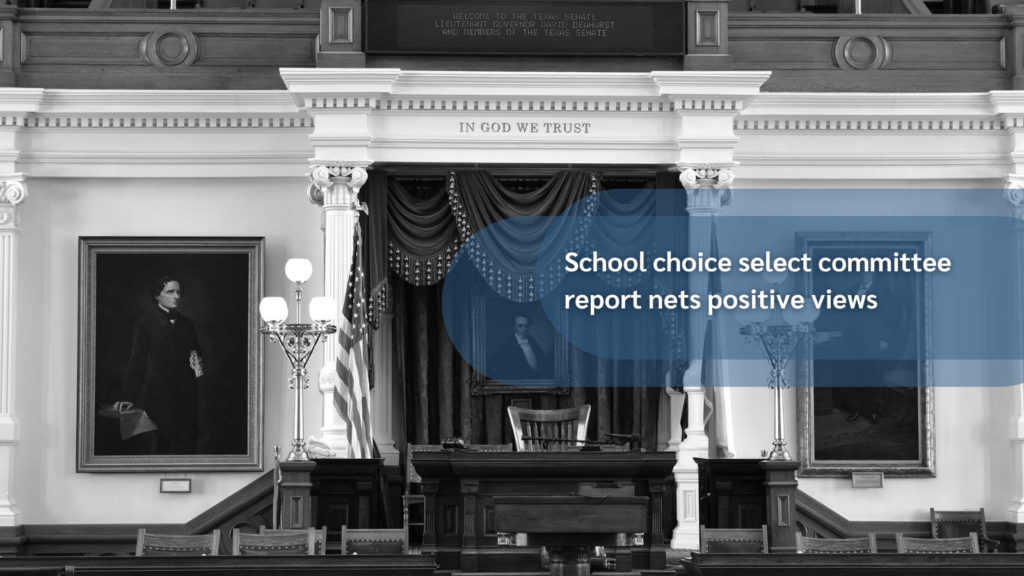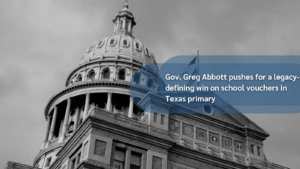With school choice likely looming for an upcoming special session, Rep. Brooks Landgraf has encountered mixed views on school choice.
His colleagues are having much the same experience.
“I’m having conversations all across West Texas about this issue. I have a certain number of constituents who want full-on vouchers. I have another set of constituents who want nothing having to do with vouchers; then a lot of folks in between who want to have something that strikes the right balance. I’m just trying to have as many conversations with constituents as possible, but I am starting to see kind of this preference for some sort of hybrid emerge,” Landgraf said in a recent phone interview.
He said his legislative colleagues are encountering some variation of that.
“I think this report also reflects that we do need to expand the options that are available to students and parents, but with an understanding that that’s going to look different in every community in the state, too, so there is a challenge in trying to account for all of those differences,” Landgraf said.
He added that he thinks the Select Committee on Educational Opportunity and Enrichment is certainly addressing the topics that are front and center for lawmakers and Texans.
“There might not be 100 percent agreement on the findings and recommendations, but I would say there’s consensus that these are the issues that need to be addressed in a future special session,” Landgraf said.
He added that only Gov. Greg Abbott can call a special session and he hasn’t done so yet. A lot of legislators are expecting Abbott will call one at some point this fall and it certainly could include funding for public schools.
“That’s definitely a possibility. I think there will be at least one special legislative session that’s dedicated to education policy, including increasing school funding,” Landgraf said.
He added that education savings accounts would not necessarily mean the death of public schools.
“I think that what was recommended in that committee report is something that can balance the needs of public schools across the state, but also make sure that students who are desperate for a lifeline are also being given the educational opportunities that they need,” Landgraf said.
In rural communities, there isn’t a lot of choice of where to attend school. But Landgraf said in the case of Wink-Loving ISD, it’s an award-winning district.
“They’re an exemplary school district. They’ve won all of these Blue Ribbon awards. They have relatively small enrollment — one of the smallest school districts in the state, but children literally come from miles around to attend those schools in Wink,” Landgraf said.
“You could fill the private school right across the street from the high school and nobody would go to it because you could get a better education at Wink because it’s so outstanding. That’s a … phenomenon that you would find in every area of the state. That’s kind of a special set of circumstances, so let’s not do anything to disrupt the winning formula that Wink has,” he added.
But in places like Houston ISD, which has some consistently failing campuses, Landgraf said, something has to be done.
“We don’t want to lose an entire generation of students in particular parts of Houston who just don’t have any educational opportunities, so trying to provide the best opportunities for every student in Texas is going to be different for each community,” Landgraf added.
His goal is for every policy decision, every vote that he takes is to ask himself what he can do to improve the educational outcomes for Texas students. For him, that is the central question because in the realm of education policy, they are there to serve students and give them the best education possible so they can have as many opportunities for a successful life as is possible.
Asked if choice works better in larger cities than smaller ones, Landgraf said it does.
“That’s the same for retail. Using that comparison with Wink and Houston, Wink has a great Allsup’s but they don’t have a Neiman Marcus. But Allsup’s is meeting the needs of the community very well just like the Wink-Loving Independent School District is meeting the educational needs. That just goes to show that …. we can’t have a one-size-fits-all policy when it comes to this because there’s a big difference between Wink and Houston,” Landgraf said.
To his credit, Landgraf said the governor was leaving the details of school choice and education savings accounts to the legislature.
“I think he has an idea of what he wants to see, but he seemed to be letting that process play out on this particular issue,” Landgraf said.
Scott Jensen, senior advisor at the American Federation for Children, Nathan Cunneen, communications strategist at AFC, and John Colyandro, who is leading lobbying efforts in Texas, said the Select Committee’s report was a good start.
“We just had a promising report come out of the Speaker’s Select Committee on how we could combine a number of good things for public schools with a private school choice option for parents through an education savings account. That report got bipartisan approval and probably will serve as a roadmap for how the House looks at this issue during the October special session,” Jensen said.
He said the Speaker was clearly trying to balance the committee, so it had five strong supporters, five strong opponents and five people who were undecided.
After deliberations and conversations with each other, they agreed to a proposal that was not quite as sweeping as Abbott had been promoting, which is universal school choice for every child in Texas, but rather focused on the students who need that option the most, Jensen said.
“They didn’t really define that, but in previous efforts, they’ve talked about bills that would cover something like 60 to 70 percent of kids in the state which would be a great start in Texas. … They got both Republicans and Democrats to sign off on that,” Jensen said.
Colyandro said this is the first time a House committee of any sort has officially endorsed school choice.
“I think it’s indicative of the progress that we are making and it’s indicative of how the politics around the school choice has shifted in our favor in Texas,” Colyandro said.
Jensen said they are very upbeat that the proposal will pass.
“The governor has been very aggressively campaigning for it all over the state. Legislators who have historically opposed the programs signed on to that report in the select committee. There are members of the legislature who have opposed it in the past and this year have said it’s coming to Texas, we just have to decide how big it’s going to be. There are a lot of people who have moved in the course of the last two years. We’ve seen it all over the country, actually, in the wake of COVID. When COVID shut down schools all over the country, parents aggressively began to look for other options to educate their kids and now I think they just have a higher level of awareness that some parts of the country have a lot of options. Texas, unfortunately, has among the least,” Jensen said.
Colyandro said the other thing to note is polling demonstrates that school choice has always been popular, and it’s also become more of a priority.
“The committee report suggested on top of a large budget increase that just passed that an additional $4.5 billion be spent on teacher pay raises and additional aids to public schools. That’s something that looks to be like about $500 million be spent on an education savings account, so it would be a second large increase to public schools in the state and then a modest start to a school choice program in Texas,” Colyandro said.
Colyandro said they often hear from critics of school choice programs that it will decimate the public schools, specifically in the context of rural schools.
“But the benefit of Texas being such a later adopter of school choice is we have the advantage of being able to look at what’s happened across the country. There’s no evidence, zero evidence, to suggest that public education would be decimated, defunded, or closed down. That just does not exist. For the critics to continue to repeat that (about) Texas is belied by the experience of 30-something other states that have adopted some version of school choice,” Colyandro said.
Cunneen said the committee report acknowledges that in this school year Texas will spend $96 billion on public schools. The most sweeping school choice proposal that passed the Senate earlier this year would have allocated $800 million for the school choice program, which is less than 1 percent of what the public schools are getting.
“Secondly, we as school choice advocates always question that basic assumption which is why are people’s first assumption that, given the choice, students aren’t going to use public schools. John referenced the history of school choice and we actually have a lot of data that shows by and large a lot of families do really like their public schools. We think that’s a great thing and they will continue to choose them. But I think it tells you a lot about this argument that the criticism hey if we give people a choice they’re going to choose to leave. That’s a very telling thing,” Cunneen said.
Jensen said this has been the most extraordinary year for passage of new school choice programs in the three-decade history of it.
“Almost in every state that passes a new program, they also pass a very large increase in aids to public schools. Our opponents continue to say that the schools have been cut. They’re going to be decimated. Clearly that’s not the case,” Jensen said. “They’ve actually had an increase in resources. What we’re for at the American Federation for Children (is) … more money for schools and more choices for parents,” Jensen said.
Jensen said they tend to prioritize special needs children in the programs that they have developed around the country.
“We have been recommending to the Texas legislature that they increase aids for special education, that any private school choice program would push poor kids and special needs kids to the front of the line. There’s going to be a limit on the amount of dollars that are available for private school choice, the number of scholarships available and those children who are most disadvantaged should be first in line, whether they be poor or special needs,” he added.
Cunneen said that fundamentally that belief goes to the core of AFC.
“It’s even ingrained in our mission statement … We believe that all students deserve to choose the best education for them, but especially low-income students and students with special learning needs. The population of students that need choice the most,” Cunneen said.




